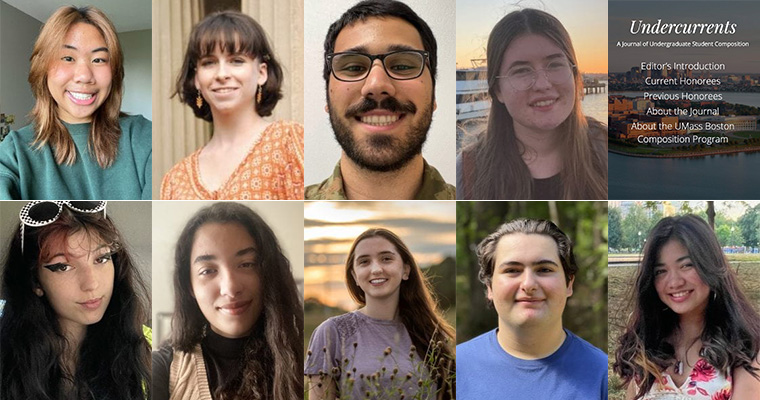New Issue of Undercurrents Puts Spotlight on First-Year Writers
The new issue of the English Department’s publication, Undercurrents: A Journal of Undergraduate Student Composition, has been released. New issues can be found on the journal’s website.

“ Their topics are heartfelt, passionate, and reflect some of the ideas that students today are grappling with. ”
Established by the English Department’s Composition Program in 2018, Undercurrents publishes outstanding writing produced by undergraduate students enrolled in first-year composition courses at UMass Boston. The Undercurrents editorial board selects these showcase essays from nominations provided by students’ writing instructors. The journal’s yearly issue is presented online by Digital Editor Dan Messier.
Like the courses in the English Department’s Composition Program, the texts cover a range of topics and disciplinary perspectives. This year’s issue highlights essays on race and rhetoric, the morality of incarceration and capital punishment, breaking free of gender norms, the consequences of digital technologies for language, learning, and intellectual development, a range of theory-based strategies for overcoming writer’s block, and a rationale for why, perhaps, “bullshit” may be more strategy than scourge.
“What stands out to me the most is that students wrote essays, and chose topics, that mattered greatly to their own lives and those around them,” said Editorial Director Brittanie Weatherbie-Greco. “Their topics are heartfelt, passionate, and reflect some of the ideas that students today are grappling with. These students were not simply writing about an assigned prompt but developing inquiries that were meaningful — and writing in a way that shared their beliefs and opinions.”
The journal is intended not only to celebrate the most accomplished written works produced by students in these first-year classes, which include ESL and Honors sections, but also to inspire and serve as a resource for students writing in these same classes now or in the future.
Quinn Gabrielle Cantor, a mathematics major born in the Philippines, wrote about Linda Villarosa's essay from the 1619 Project in the New York Times in her essay, “Race and Rhetoric: Examining How the Audience’s Race Creates Rhetorical Constraints and Influences Rhetoric.”
“Having my essay chosen to be published in the Undercurrents journal makes me feel elated and proud. It wasn't something I expected to happen, as I've never felt that confident about my writing skills,” Cantor said. “However, after having my essay published, it not only gave me a newfound sense of confidence in my writing abilities, but it also made me appreciate how much I've grown as a writer, especially with the help of Prof. [Susan] Field and Prof. [Natalia] Scarpetti.”
Associate Professor of English Lauren M. Bowen, director of the Composition Program and editor-in-chief of Undercurrents, said the nine works in this year’s publication “represent the range of interests, voices, and talents that UMass Boston students share with us each year.”
The nine student honorees and their essays are:
- Quinn Gabrielle Cantor (Mathematics): Race and Rhetoric: Examining How the Audience’s Race Creates Rhetorical Constraints and Influences Rhetoric
- Alex Der-Kazaryan (Management): Textism and The Shift In English Writing
- Emma Kennedy (Latin American and Iberian Studies): What’s in a Name?: A Discussion of the Nature of Bilingual Education in the United States
- Anna Krasnoslobodtseva (Biochemistry): Moral Punishment
- Kylie Medeiros (Biology): Your Teachers Are Bullshitting You
- Vance Naftal (International Relations): Fake News’ Negation of a Useful Education
- Karina Silva (Psychology): The Brain, The Block, The Bummed Writer
- Jillian Steeves (History): Rage Against the Machine: How Screen Time is Impairing Our Intelligence and What We Can Do About It
- Ina Tolentino (Nursing/Psychology): Breaking Free from Gender Norms: Adolescent Constructions of Femininity Through the Patriarchy and High School Musical
“It is important to our Composition Program to publish the voices of our students because we desire to embrace the power that writing affords. Students from all majors take Composition courses so we have a wide range of interests and passions in each classroom,” Weatherbie-Greco said. “We know that when students are empowered to write, with authority and authenticity, that they come to see themselves as members of the academic community and feel a desire to contribute to the ongoing issues that matter to them. We want them to know that their voice matters and that it is vital they speak up and help shape not just academia but the world beyond.”